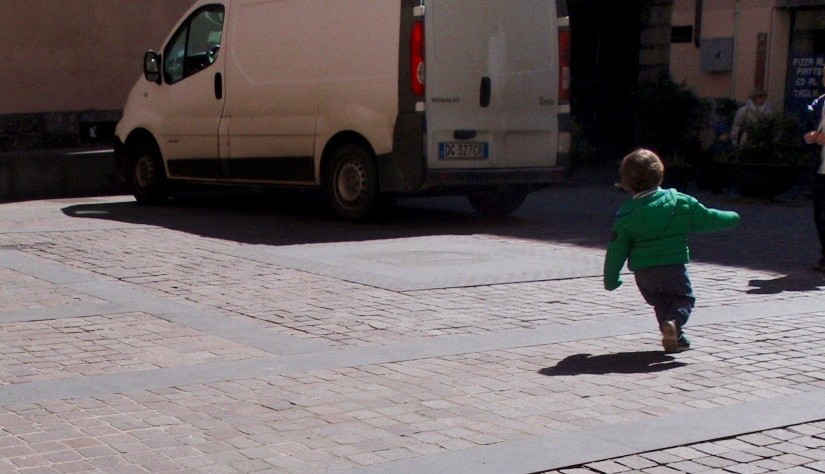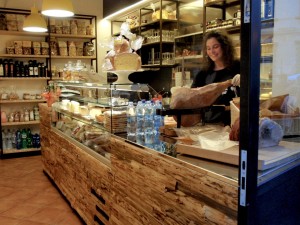The ingredients are simple. One patron saint, a couple hundred children, an even greater number of their family and friends, some twisty streets, and a whistle. Oh yeah, some really dedicated and (so I hear) wonderful teachers.
Claudia let me know this was happening, both her boys would be involved. “At nine-thirty Saturday morning, there is an event in Piazza del Duomo. Confusion reigns supreme.” How could I not show up? I had no idea what I was going to.
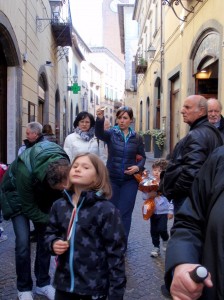 On the way down Via del Duomo I check the alimentari owned by my friends Vera and Giovanni. As they’ve grown older, their previous schedule of Giovanni in the morning, Vera in the afternoon, and both together after four, has concentrated to include only the both together shift and that not until six. It makes it harder to remember to visit, so I made a special point to do so in early February. “We’re closing for a few weeks on Monday,” Vera told me. “The entire place is being restructured.” I’ve been peaking on my way past the store for two weeks now, but the windows, covered with sheets of white paper, have not let me discover what might be going on inside. This morning is no different.
On the way down Via del Duomo I check the alimentari owned by my friends Vera and Giovanni. As they’ve grown older, their previous schedule of Giovanni in the morning, Vera in the afternoon, and both together after four, has concentrated to include only the both together shift and that not until six. It makes it harder to remember to visit, so I made a special point to do so in early February. “We’re closing for a few weeks on Monday,” Vera told me. “The entire place is being restructured.” I’ve been peaking on my way past the store for two weeks now, but the windows, covered with sheets of white paper, have not let me discover what might be going on inside. This morning is no different.
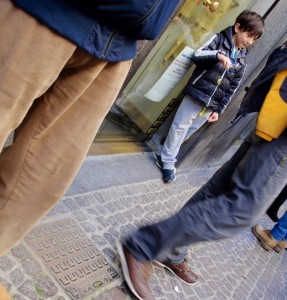 In the piazza, a large crowd has gathered, lots of children, ages young to younger, wearing numbers safety-pinned to their shirts. Just about everyone I know or am familiar with in Orvieto is here. The first I meet are Natsuko and Andrea. “Don’t you love seeing the piazza full of people like this?” Andrea says, more or less greeting me with a statement. “Wonderful things happen here. I want to install a webcam.” He points up to a window I never in my mind connected with his apartment. “One night, I looked out my library window and there were three cellists formally dressed playing on the steps of the Duomo. No one else in the square, just them.”
In the piazza, a large crowd has gathered, lots of children, ages young to younger, wearing numbers safety-pinned to their shirts. Just about everyone I know or am familiar with in Orvieto is here. The first I meet are Natsuko and Andrea. “Don’t you love seeing the piazza full of people like this?” Andrea says, more or less greeting me with a statement. “Wonderful things happen here. I want to install a webcam.” He points up to a window I never in my mind connected with his apartment. “One night, I looked out my library window and there were three cellists formally dressed playing on the steps of the Duomo. No one else in the square, just them.”
A few minutes later Claudia emerges from the crowd, and a few after that Giorgio dashes by, dressed a little like he’d just stepped off a trans-Atlantic voyage with Noel Coward. It’s nine-forty, nothing has happened yet. At least nothing organized. I ask Natsuko what the kids are going to do. She describes a complicated route through a part of town sort of centered around the Liceo. I imagine a procession. After all it’s San Giuseppe’s Day, the city’s patron. I nod in response, smile, and take in the crowd.
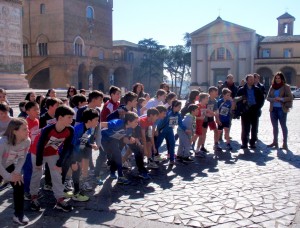 The crowd grows thick. Children organize themselves into groups. Other people I know appear and disappear. Then the kids who have coalesced at the mouth of Via Maitani, which leads into town across from the central door of the Duomo, assume starting positions, leaning into an imaginary wind. I ask
The crowd grows thick. Children organize themselves into groups. Other people I know appear and disappear. Then the kids who have coalesced at the mouth of Via Maitani, which leads into town across from the central door of the Duomo, assume starting positions, leaning into an imaginary wind. I ask
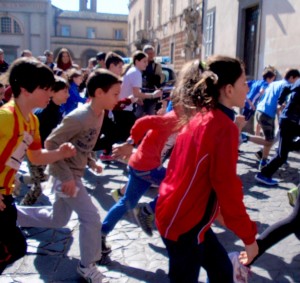 Claudia “Is this a race?” She doesn’t hear me, but it sure is starting to look like it. Then one of a group of who seem to be teachers, steps forward with a coach’s whistle, gives it a mighty and throaty blast, the group of kids spills into Maitani, and most of the adults run – albeit at a slower pace – towards Via del Duomo.
Claudia “Is this a race?” She doesn’t hear me, but it sure is starting to look like it. Then one of a group of who seem to be teachers, steps forward with a coach’s whistle, gives it a mighty and throaty blast, the group of kids spills into Maitani, and most of the adults run – albeit at a slower pace – towards Via del Duomo.
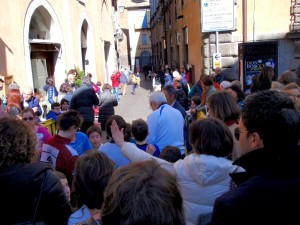 We congregate in what is variously called Piazza Gualtieri or Piazza San Giuseppe. Soon a policeman on a beautiful motor cycle with sirens blaring and lights flashing clears a path. He is followed by a pack of kids running like demons towards a subtly identified finish
We congregate in what is variously called Piazza Gualtieri or Piazza San Giuseppe. Soon a policeman on a beautiful motor cycle with sirens blaring and lights flashing clears a path. He is followed by a pack of kids running like demons towards a subtly identified finish 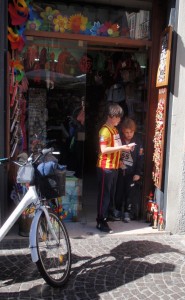 line. Enrico, Claudia’s husband, now appears out of the crowd, and their sons, blond Adreas and dark Tobia emerge from the runners’ pack and go off to collect their gold medals and chocolate eggs.
line. Enrico, Claudia’s husband, now appears out of the crowd, and their sons, blond Adreas and dark Tobia emerge from the runners’ pack and go off to collect their gold medals and chocolate eggs.
But that’s not all of it. Much of the crowd now retraces towards Piazza del Duomo where a group of younger students are preparing their race for grace. The same thing happens again, only the contestants are a foot or so shorter. And a third time, with contestants so young they must have been assigned a special route, for their efforts are more to keep going in a single direction than speed. Each race is given a police escort, gold metals, and chocolate eggs (dimensions of which diminish slightly to match the corporeal size of the contestant.)
The crowd now strolls over to Bar Montanucci where the good people there have set up a table with dolce, coffee, and other snacks, free for participants and their elders. On the way I glance at the alimentari, and in the previous hour the paper has been removed and the new interior exposed for the town to admire. I excuse myself and step inside to congratulate Giovanni (Vera is not there.) “It’s beautiful,” I say. “Yeah, and pretty darned expensive,” he replies. Their daughter brightly repeats the slogan that was hand-written across the paper just torn down; “the tradition continues!” She and Sabrina, her daughter-in-law, are bustling about making final adjustments to products on display. It really is beautiful, and I say it again. Giovanni smiles, shrugs, and shakes my hand. I’ve been planning a gift for this moment, so excuse myself until I can find one.
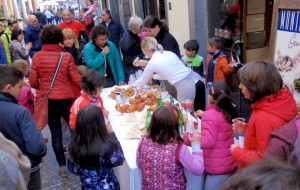 At Montanucci, the scene is a dance of children and dogs and grandparents. Children with their medals and eggs, children in strollers, children toddling, falling, running, greeting and making friends on all sides. Andreas and Tobia run up to announce that their school, Luigi Barzini, was the
At Montanucci, the scene is a dance of children and dogs and grandparents. Children with their medals and eggs, children in strollers, children toddling, falling, running, greeting and making friends on all sides. Andreas and Tobia run up to announce that their school, Luigi Barzini, was the 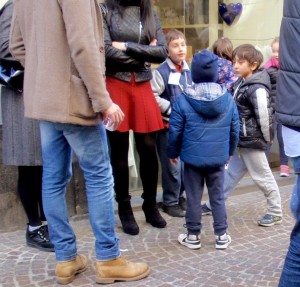 overall winner of the race. How this was determined, I have no idea, nor does anyone else seem to know, but joy is registered all around. I don’t ask what other schools competed as I’m afraid there might not have been any, and why dampen the flush of victory.
overall winner of the race. How this was determined, I have no idea, nor does anyone else seem to know, but joy is registered all around. I don’t ask what other schools competed as I’m afraid there might not have been any, and why dampen the flush of victory.
Claudia and Enrico suggest I join them for lunch in Monterubiaglio. Claudia is returning to Orvieto early afternoon to pass petitions against using animals in studies on substance abuse, so I have rides both ways. The kids find us, and we walk towards Piazza Fracassini and one of the fresh pasta stores. There’s quite a crowd there, too. Claudia disappears, the boys run off somewhere, Enrico goes on ahead. When Claudia emerges she’s carrying two clamshells of ombrichelli, a thick, hand-rolled pasta typical to the region. “A gift to all who participated, today,” she reports, pleased and amazed. “Every year like this.”
We lunch on ombrichelli (and cheese, and favas plucked fresh from their shells,) I ride back with Claudia, take a short nap, and hit the streets again. At nearly five the festivities are still going. I run into Andrea, Natsuko, and theirs guests for the day, Hugh and Paola, and am invited to dinner.
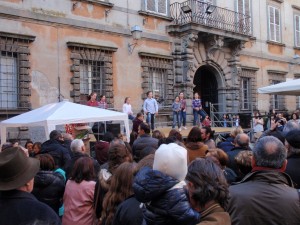 Another round of races has begun. This one features boys of about 15, a team from each of the four quartiere, with each team member carrying what looks like it might be giant chocolate egg wrapped in colored foil – but the contents is never verified. Teams of girls and young women, each with a single male recruit to give their routines a point of focus (or so it would seem) perform on the stage set up for the festival. They do dance numbers, nicely choreographed, learned with studied determination, and presented with varying degrees of self-consciousness. Their courage and enthusiasm are greeted with appropriate abandon by the audience.
Another round of races has begun. This one features boys of about 15, a team from each of the four quartiere, with each team member carrying what looks like it might be giant chocolate egg wrapped in colored foil – but the contents is never verified. Teams of girls and young women, each with a single male recruit to give their routines a point of focus (or so it would seem) perform on the stage set up for the festival. They do dance numbers, nicely choreographed, learned with studied determination, and presented with varying degrees of self-consciousness. Their courage and enthusiasm are greeted with appropriate abandon by the audience.
At about six, I stop at the flower stand under the loggia of Sant’Andrea to choose a mini rose bush with orange blooms. The lady wraps it elegantly, and I find my way through the crowds to the alimentari. Sabrina and a grand-daughter are the only ones in the shop. I present my rose. They are gracious. “Giovanni got tired and went home. Vera has a pain in her hip, so won’t be coming in.” They have other things on their minds, but I cleave to the hope the flower will be delivered, and that Vera will figure out who it’s from. Disappointed, I ask them to pass on my good wishes and slide into the street. I love those two, wanted so much to connect.
Awards are being given now to the young men who raced with their gigantic, and supposed, chocolate eggs. Each team has its own character, as if they were each from a different sub-culture, each quartiere enforcing its invisible rule. The young priest presenting the awards is enthusiastic and careful to point out that although this is a feast day of the church, it is more importantly a celebration of the city, the culture, and the community – regardless of one’s relationship to religion. I wonder if this disclaimer is made possible (or necessary) by centuries of direct papal rule, a period no one contemplates with pleasure.
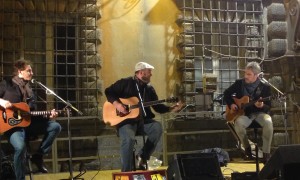 A band of three acoustic guitarists takes the stage. They are called “The Bartenders,” and are marvelous. The lead musician was a teacher of mine at LinguaSi a dozen years ago. As always there is a space in front of the stage for little children to dance, and a flock of them willingly oblige. One particularly brilliant little girl is repeatedly held back by her grandmother, as if the woman believes dancing to be dangerous or immoral. The girl doesn’t complain, but as soon as her nonna’s attention wanes, she’s back into the swing. Grandma is unwittingly cultivating a ballerina.
A band of three acoustic guitarists takes the stage. They are called “The Bartenders,” and are marvelous. The lead musician was a teacher of mine at LinguaSi a dozen years ago. As always there is a space in front of the stage for little children to dance, and a flock of them willingly oblige. One particularly brilliant little girl is repeatedly held back by her grandmother, as if the woman believes dancing to be dangerous or immoral. The girl doesn’t complain, but as soon as her nonna’s attention wanes, she’s back into the swing. Grandma is unwittingly cultivating a ballerina.
I listen for a half hour, then go for dinner. Vera’s grand daughter is in the alimentari (renamed, as I now notice, “Botega Vera”) slicing prosciutto. I ask for a photo. She waves her hand and says “sure”, apparently of the opinion that slicing salted meat is not her most flattering angle.
